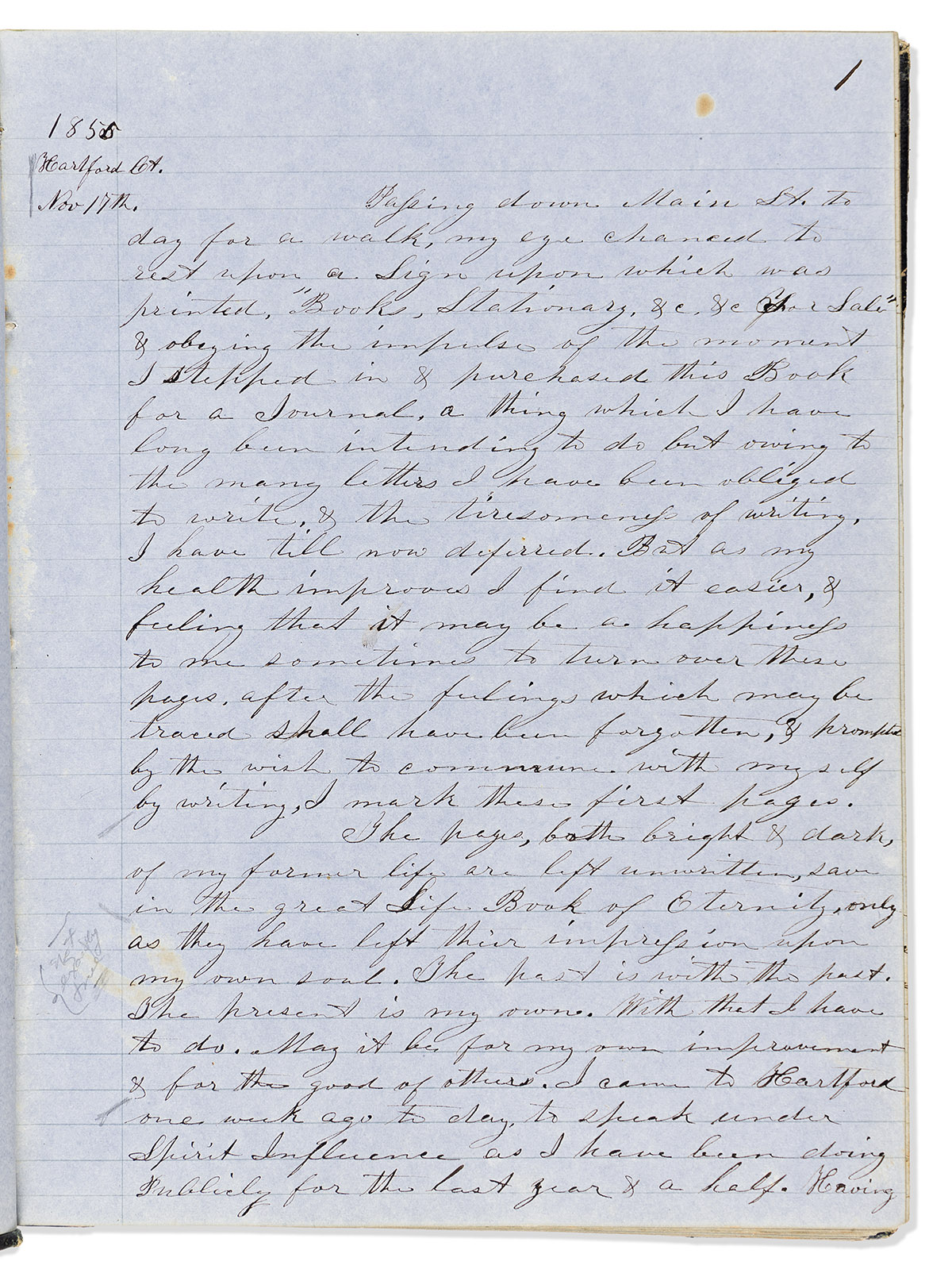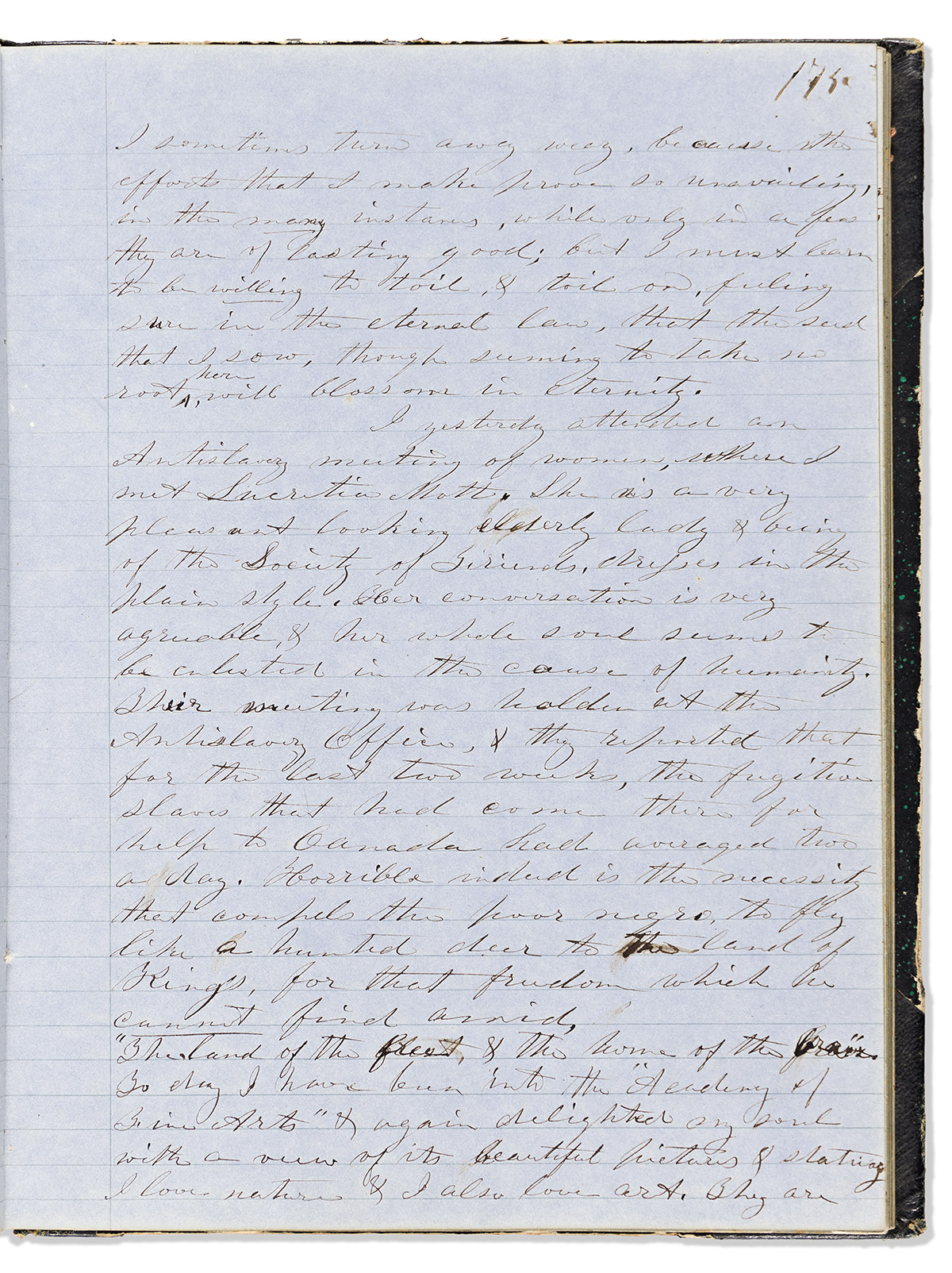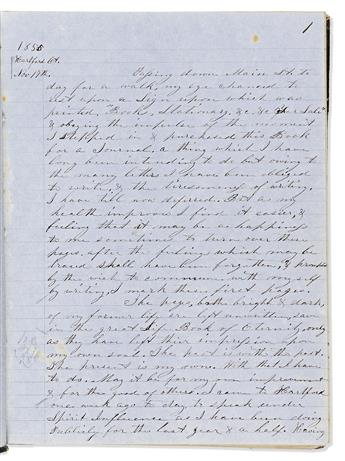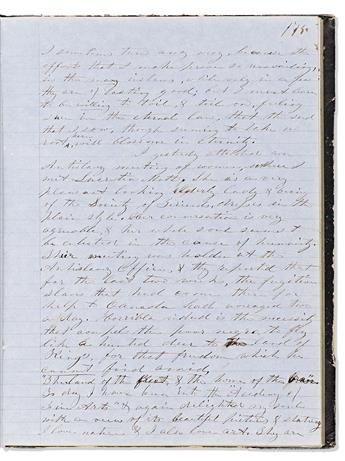Sale 2646 - Lot 262
Price Realized: $ 8,500
Price Realized: $ 10,625
?Final Price Realized includes Buyer’s Premium added to Hammer Price
Estimate: $ 5,000 - $ 7,500
(SPIRITUALISM.) Achsa W. Sprague. Diary of a renowned touring spiritualist medium from early in her career. 179 manuscript diary pages, plus a 5-page table of contents in the same hand, and cash accounts by a later owner. 4to, original 1/2 sheep, minor wear; minimal wear to contents. Various places, 17 November 1855 to 22 June 1857
Additional Details
Achsa White Sprague (1827-1862) of Plymouth Notch, VT overcame severe chronic illness to become one of the most renowned Spiritualist mediums and lecturers in America in the years preceding her death. She was also an abolitionist and advocate for women's rights. This diary was written as she was reaching the crest of her fame.
This diary begins with the purchase of the blank volume from a stationery store in Hartford, CT on 17 November 1855: "I came to Hartford one week ago today to speak under spirit influence, as I have been doing publicly for the last year & a half." She discusses her spiritualist beliefs frequently and frankly, adding other gothic details: "I have spent a part of two days walking in the cemeteries here. I have enjoyed it much" (17 November 1855). "Is it possible that I am the same being who three years ago lay in a dark room in pain & anguish with no hope of relief? And all this change wrought by my spirit friends" (19 November 1855). The sincerity of her convictions is consistent and strong. "My inner self keeps a communion within that satisfies the soul beyond all outer communings. This is the most beautiful part of my mediumship, that which others do not see, that which is never spoken, but which is felt in every fibre of my soul" (21 November 1855). Describing an oyster supper which preceded one of her events, she would rather "dispense with the supper, which will do no one any particular good, & give the same amount to an object or objects of charity. This I think would be practical spiritualism & we need more of that. Let me practice, let me practice is my motto & I wish I could live up to it" (17 January 1856, page 79).
She was deeply interested in the corporeal world as well, providing long and enthusiastic descriptions of visits to Hartford's school for the deaf, Charter Oak, and silver plating factory just in the diary's opening ten pages. On 24 March 1856 she discusses her hopes to speak in the Massachusetts State Prison.
Sprague often crossed paths with notable public figures. She describes a Hartford medium session on 20 November 1855 with about 20 guests, some of them notable: "Colonel [Samuel] Colt, the man who built the dyke around the city, & who is known far & near by his revolvers . . . & William H. Burleigh, the poet. . . . I thought Col. Colt rather an original, just like nobody else." The next day, "the wife of Mr. Gerrit Smith has been here today for an examination. I have always admired the character of Gerrit Smith, a soul that lives for humanity." She heard Theodore Parker speak on 1 April 1856, and on 23 May 1856 visited an art gallery with famed engraver Samuel Sartain and his wife Dr. Harriet Judd Sartain.
On 11 June 1857, she "attended an antislavery meeting of women, where I met Lucretia Mott. She is a very pleasant-looking elderly lady & being a member of the Society of Friends, dresses in the plain style. Her conversation is very agreeable, & her whole soul seems to be enlisted in the cause of humanity." At the Antislavery Society office, "for the last two weeks, the fugitive slaves that had come there for help to reach Canada had averaged two a day. Horrible indeed is the necessity that compels the poor Negro to fly like a hunted deer to the land of kings for that freedom he cannot find amid 'the land of the free & the home of the brave.'"
Sprague's proto-feminism is often in evidence, as when a local association refused to invite Reverend Antoinette L. Brown for a lecture, "to their shame be it spoken. It is bad enough to see men who assume the right to occupy the whole platform for public speaking . . . telling & saying what women shall or shall not do . . . but when woman herself, through a false education which has bound her mind in chains . . . limits her own sphere . . . it is enough to bring the blush of shame upon every woman's cheek" (10 December 1855).
Sprague begins this diary with a long residence in Hartford, CT and then spends the winter of 1855-1856 locally, speaking in various Vermont towns and avoiding very long trips. In March 1856 she resumes more extensive touring with trips to New Hampshire, Boston, Providence, Philadelphia, and beyond. The diary entries are somewhat regular for the first several months, and become less frequent after about June 1856.
Extensive selections from this diary (along with her now-lost earlier 1849-1853 diary) were published in 1941 as "Selections from Achsa Sprague's Diary and Journal" in the Proceedings of the Vermont Historical Society 9 (1941): 131–184. The passages chosen for publication are marked in pencil in the original diary. The Vermont Historical Society holds a large collection of her correspondence.
The diary was apparently inherited by Achsa's older sister Orvilla Sprague Josselyn (1819-1872), and then in 1877 passed to her son, farmer Lloyd Norris Josselyn (1857-1945) of Tyson's Furnace in Plymouth, VT. He inscribed the flyleaf and used the rear pages for his cash accounts from 1880 to 1909.
This diary begins with the purchase of the blank volume from a stationery store in Hartford, CT on 17 November 1855: "I came to Hartford one week ago today to speak under spirit influence, as I have been doing publicly for the last year & a half." She discusses her spiritualist beliefs frequently and frankly, adding other gothic details: "I have spent a part of two days walking in the cemeteries here. I have enjoyed it much" (17 November 1855). "Is it possible that I am the same being who three years ago lay in a dark room in pain & anguish with no hope of relief? And all this change wrought by my spirit friends" (19 November 1855). The sincerity of her convictions is consistent and strong. "My inner self keeps a communion within that satisfies the soul beyond all outer communings. This is the most beautiful part of my mediumship, that which others do not see, that which is never spoken, but which is felt in every fibre of my soul" (21 November 1855). Describing an oyster supper which preceded one of her events, she would rather "dispense with the supper, which will do no one any particular good, & give the same amount to an object or objects of charity. This I think would be practical spiritualism & we need more of that. Let me practice, let me practice is my motto & I wish I could live up to it" (17 January 1856, page 79).
She was deeply interested in the corporeal world as well, providing long and enthusiastic descriptions of visits to Hartford's school for the deaf, Charter Oak, and silver plating factory just in the diary's opening ten pages. On 24 March 1856 she discusses her hopes to speak in the Massachusetts State Prison.
Sprague often crossed paths with notable public figures. She describes a Hartford medium session on 20 November 1855 with about 20 guests, some of them notable: "Colonel [Samuel] Colt, the man who built the dyke around the city, & who is known far & near by his revolvers . . . & William H. Burleigh, the poet. . . . I thought Col. Colt rather an original, just like nobody else." The next day, "the wife of Mr. Gerrit Smith has been here today for an examination. I have always admired the character of Gerrit Smith, a soul that lives for humanity." She heard Theodore Parker speak on 1 April 1856, and on 23 May 1856 visited an art gallery with famed engraver Samuel Sartain and his wife Dr. Harriet Judd Sartain.
On 11 June 1857, she "attended an antislavery meeting of women, where I met Lucretia Mott. She is a very pleasant-looking elderly lady & being a member of the Society of Friends, dresses in the plain style. Her conversation is very agreeable, & her whole soul seems to be enlisted in the cause of humanity." At the Antislavery Society office, "for the last two weeks, the fugitive slaves that had come there for help to reach Canada had averaged two a day. Horrible indeed is the necessity that compels the poor Negro to fly like a hunted deer to the land of kings for that freedom he cannot find amid 'the land of the free & the home of the brave.'"
Sprague's proto-feminism is often in evidence, as when a local association refused to invite Reverend Antoinette L. Brown for a lecture, "to their shame be it spoken. It is bad enough to see men who assume the right to occupy the whole platform for public speaking . . . telling & saying what women shall or shall not do . . . but when woman herself, through a false education which has bound her mind in chains . . . limits her own sphere . . . it is enough to bring the blush of shame upon every woman's cheek" (10 December 1855).
Sprague begins this diary with a long residence in Hartford, CT and then spends the winter of 1855-1856 locally, speaking in various Vermont towns and avoiding very long trips. In March 1856 she resumes more extensive touring with trips to New Hampshire, Boston, Providence, Philadelphia, and beyond. The diary entries are somewhat regular for the first several months, and become less frequent after about June 1856.
Extensive selections from this diary (along with her now-lost earlier 1849-1853 diary) were published in 1941 as "Selections from Achsa Sprague's Diary and Journal" in the Proceedings of the Vermont Historical Society 9 (1941): 131–184. The passages chosen for publication are marked in pencil in the original diary. The Vermont Historical Society holds a large collection of her correspondence.
The diary was apparently inherited by Achsa's older sister Orvilla Sprague Josselyn (1819-1872), and then in 1877 passed to her son, farmer Lloyd Norris Josselyn (1857-1945) of Tyson's Furnace in Plymouth, VT. He inscribed the flyleaf and used the rear pages for his cash accounts from 1880 to 1909.
Exhibition Hours
Exhibition Hours
Aliquam vulputate ornare congue. Vestibulum maximus, libero in placerat faucibus, risus nisl molestie massa, ut maximus metus lectus vel lorem.






